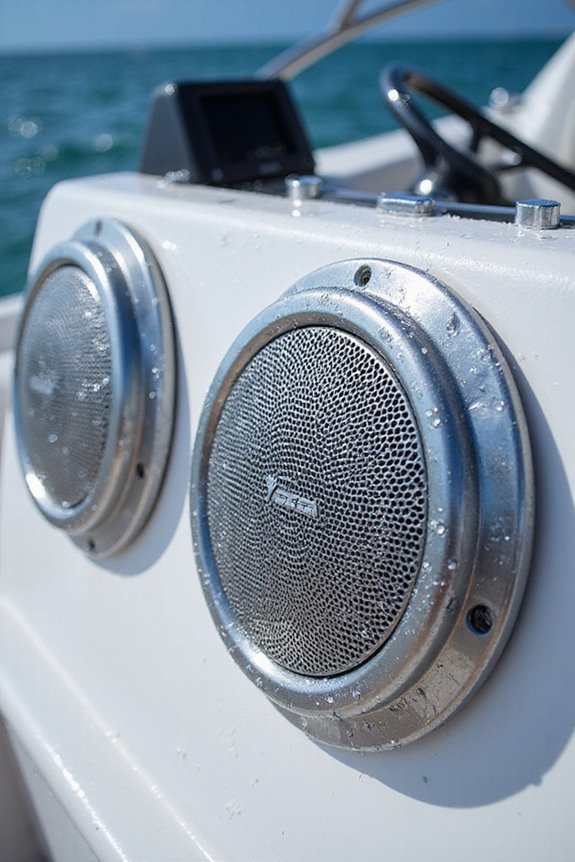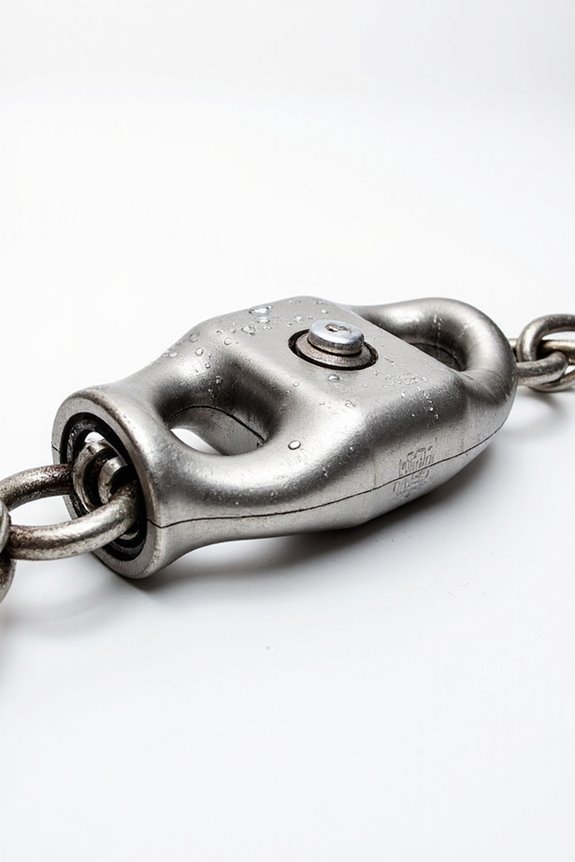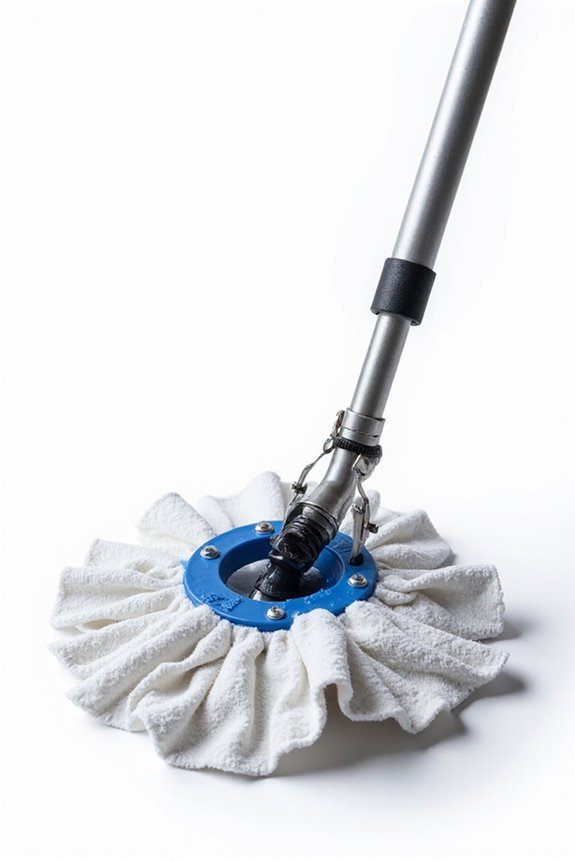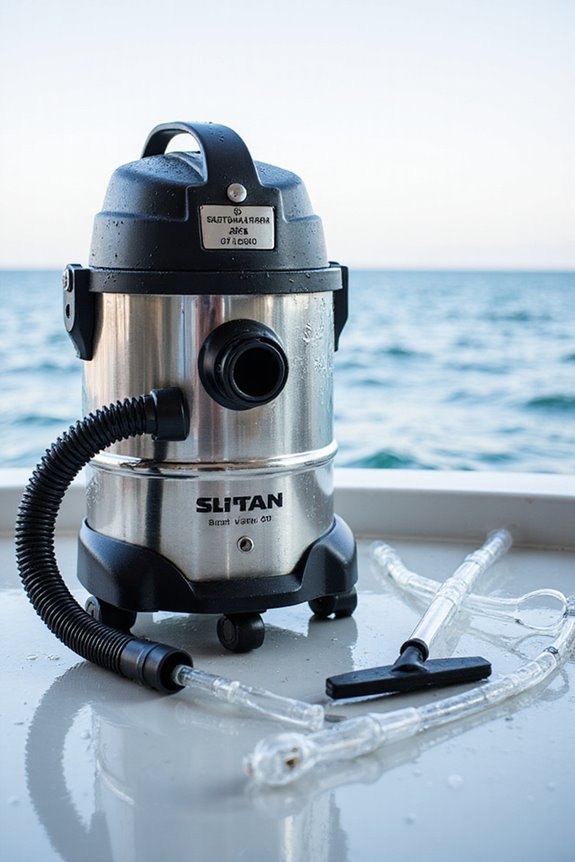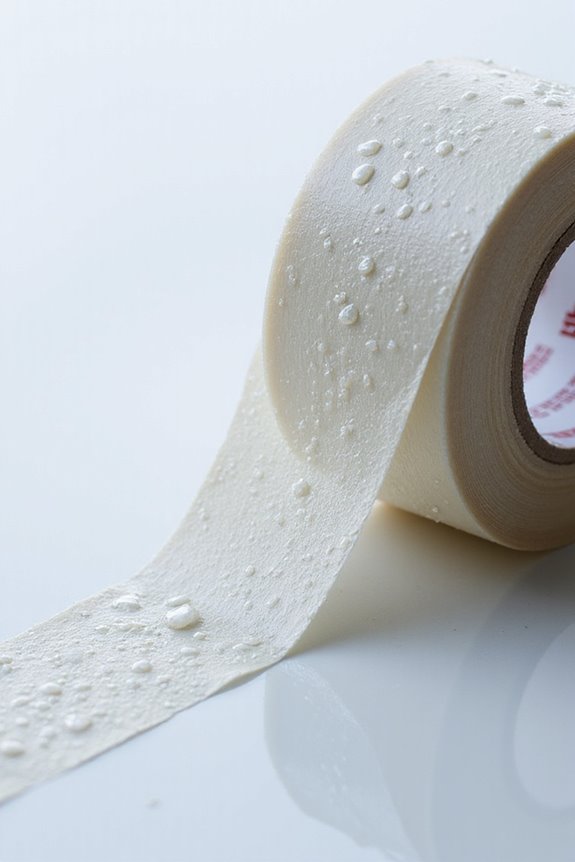When we talk about IP ratings on boat speakers, they’re basically a code telling us how well the speakers stand up to dust and water — like how tough is tough enough for those salty waves? Usually, an IPX5 or higher guarantees your music stays crisp in splashes or even brief submersion. But remember, salt, sun, and bumps also throw curveballs beyond those numbers. Want to keep your tunes trouble-free? We’ve got tips that really make a difference.
Key Takeaways
- IP ratings show a speaker’s protection against dust (first digit) and water (second digit) crucial for marine environments.
- IPX5 to IP67 ratings ensure varying levels of water resistance, from splashes to temporary submersion in boats.
- Salt corrosion, UV rays, and temperature shifts pose risks beyond IP ratings, affecting speaker durability on boats.
- Marine-grade speakers use corrosion-resistant materials, UV-resistant grills, and weatherproof seals to withstand harsh marine conditions.
- Regular cleaning, inspections, and using waterproof covers prolong marine speaker lifespan amid constant exposure to elements.
What IP Ratings Mean for Boat Speakers
While it might seem like all boat speakers labeled “waterproof” are created equal, there’s actually a lot more going on beneath that simple label—namely, the IP rating. This little code tells us how well a speaker can handle dust and water—a must-know if we want our sound system to last through salty waves and unexpected splashes. The IP rating significance lies in its two digits: the first shows protection against solids like dust, and the second against liquids. Choosing speakers with the right IP rating means better speaker longevity and fewer surprises. After all, wouldn’t we rather have rock-solid tunes than a drowned speaker halfway through our day on the water? Understanding these ratings helps us make smarter choices, keeping our boat rocking and rolling.
Recommended Waterproof Ratings for Marine Use
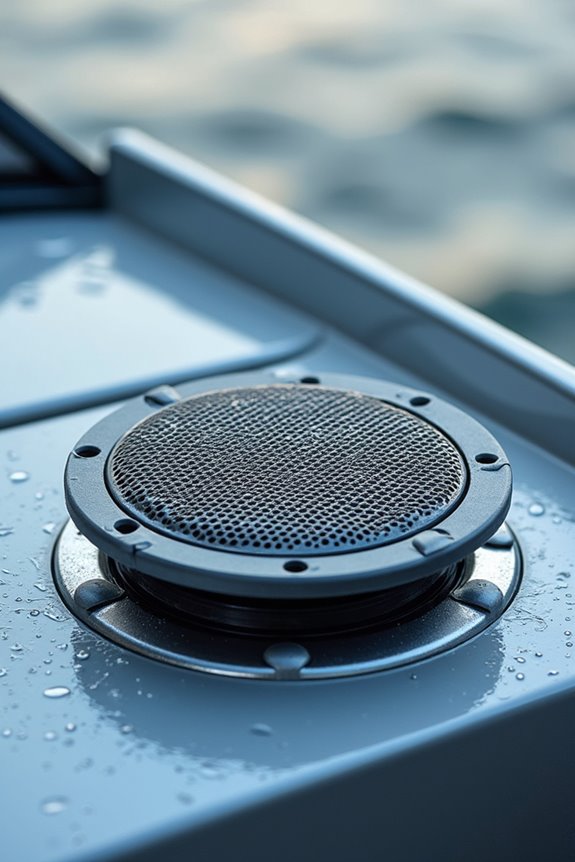
Now that we recognize how IP ratings reveal a speaker’s defense against dust and water, let’s chat about the ratings that actually make sense out on the water. For marine audio, starting at IPX5 is smart—these speakers resist water jets, perfect for splashes and spray during your boating adventures. Want to kick it up a notch? IP65 or IP66 ratings mean dustproofing and tougher water resistance, great for open decks and salt spray. If occasional dips happen, IP67 speakers handle submersion up to 1 meter for 30 minutes. And for those who face rough waters regularly, the premium IPX7 or IPX8 waterproof technology provides solid protection, keeping your tunes rolling no matter what. So, pick a rating that fits your boating style—your ears will thank you!
Real-World Challenges Beyond IP Ratings
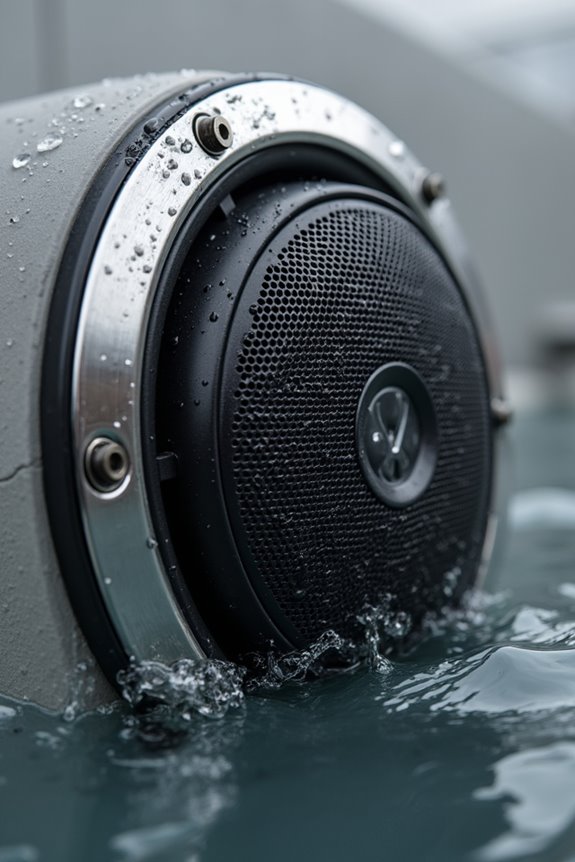
Even though IP ratings give us a helpful baseline for how waterproof a speaker might be, they don’t tell the whole story when it comes to real-life marine adventures. Real world conditions in marine environments throw a lot at our gear—salt spray, sun, rough waves—that lab tests just can’t mimic. An IP67 speaker might survive 30 minutes underwater, but what about salt corrosion that slowly eats away at metal parts? Or UV rays that dry out plastics, causing cracks? Even the best IP68 rating won’t guarantee protection from temperature swings or sand blasting your speakers during a windy day. And don’t forget mechanical stress—boat vibrations and accidental bumps can mess with installations that weren’t done right. So, can we really rely on IP ratings alone? Not quite. We’ve got to think beyond those numbers.
Features Enhancing Marine Speaker Durability
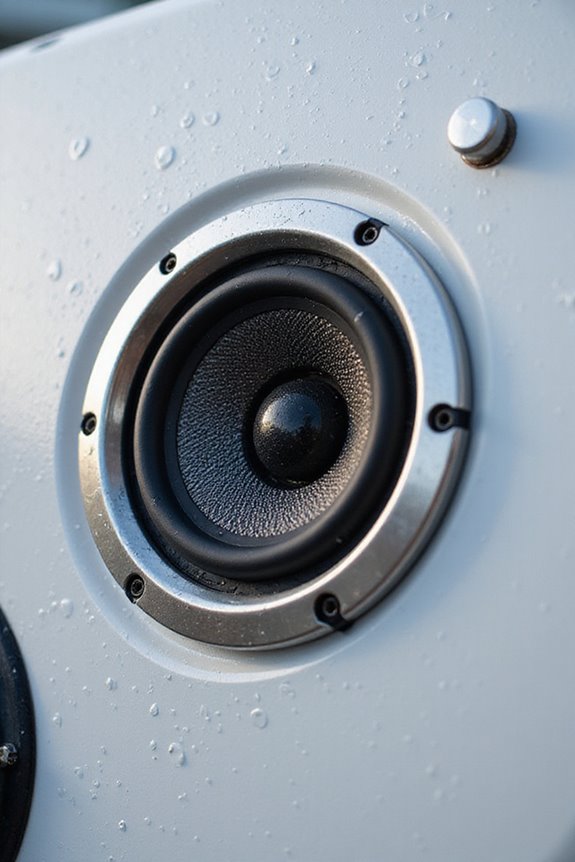
When it comes to boosting your marine speaker’s durability, a handful of smart features really make all the difference. We’re talking marine materials like polypropylene cones and butyl rubber surrounds, which hold up strong against moisture and temperature swings—key for speaker longevity. Ever wondered why stainless steel housings are the go-to? They fight corrosion from saltwater like champs. Plus, UV-resistant ABS grills keep things looking fresh, avoiding that brittle, faded look after sunbathing all day. Weatherproof designs with solid seals stop water from sneaking in, while reinforced surrounds and dense cones boost impact resistance. Toss in anti-corrosion coatings and quick-release buckles, and your speakers are armed from every angle. These thoughtful features don’t just protect—they guarantee your sound system thrives on the water, no matter what.
Maintenance Tips to Prolong Waterproof Speaker Life
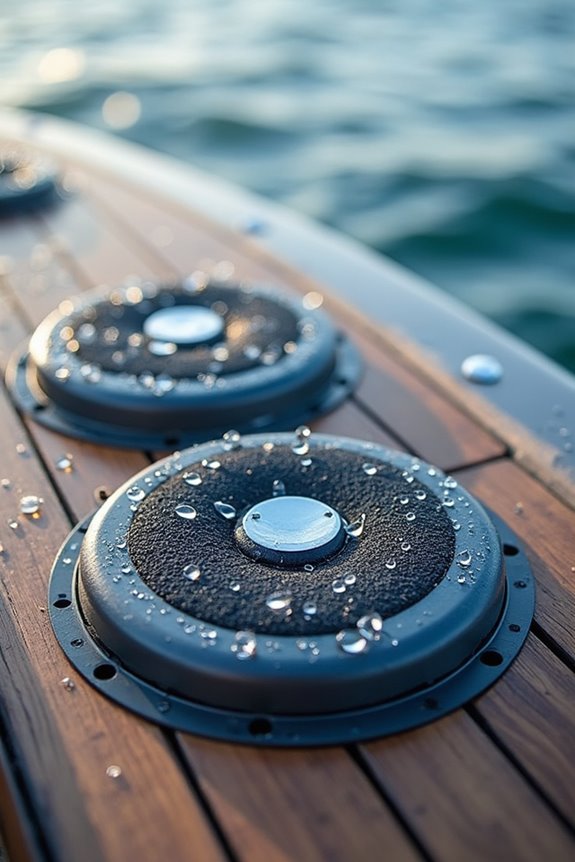
Since we want our waterproof speakers to keep sounding great and avoid unexpected splashes of silence, regular maintenance is key. Let’s talk cleaning techniques: a gentle wipe with a soft damp cloth removes salt and dust without letting moisture sneak inside. Using mild soap is fine, but harsh detergents? Let’s leave those for the laundry. Ever thought of compressed air? It’s great for clearing dust from vents without dismantling anything. We should also inspect speakers frequently—looking for loose wiring, corrosion, or damaged grilles. If anything looks off, it’s best to fix it pronto, or invest in professional repairs. And when not cruising, don’t forget waterproof covers to shield from sun and salt spray. These steps aren’t just chores—they’re our secret to speaker longevity!
Frequently Asked Questions
Can Waterproof Speakers Connect Wirelessly Over Long Boat Distances?
Like casting wireless technology across the waves, we ponder if long range connectivity thrives on boats. Together, we realize Bluetooth can suffice but obstacles challenge us, so sometimes RF streaming or boosters keep us all connected and enjoying the music.
How Does Waterproofing Affect Speaker Sound Quality on Boats?
We understand maintaining sound clarity and frequency response is essential on the water. Waterproofing helps keep moisture out, so our speakers sound crisp and clear, letting us all enjoy consistent, high-quality tunes together, no matter the conditions.
Are Waterproof Boat Speakers Compatible With All Marine Audio Systems?
It’s important to recognize speaker compatibility can vary, and waterproof boat speakers aren’t automatically compatible with every marine audio system. For seamless audio system integration, it’s vital we match power, size, and connectivity to get the best sound together.
What Is the Average Battery Life of Waterproof Marine Speakers?
When considering battery lifespan in marine technology, we find waterproof marine speakers typically last between 10 to 14 hours. Together, we can choose models that keep us connected and powered, enhancing every boating adventure.
Do Floating Speakers Affect Sound Performance on Water?
It is understood that floating speaker design plays a big role, as it shapes sound wave propagation on water. Together, we can appreciate how these designs help deliver clear, immersive audio that overcomes water’s unique challenges.

